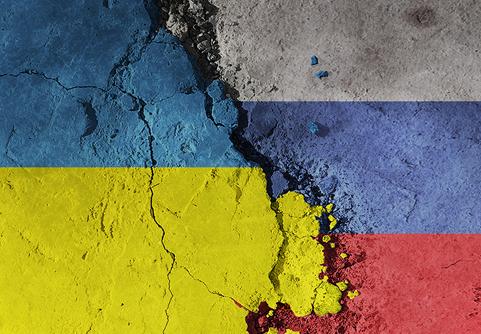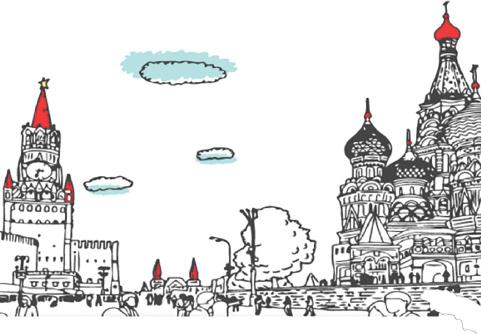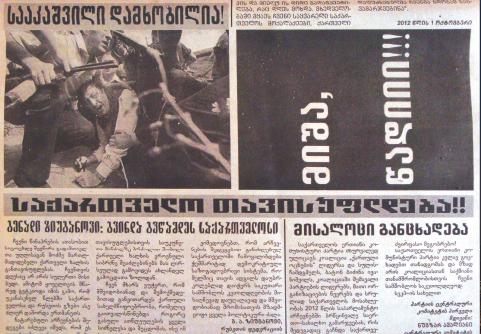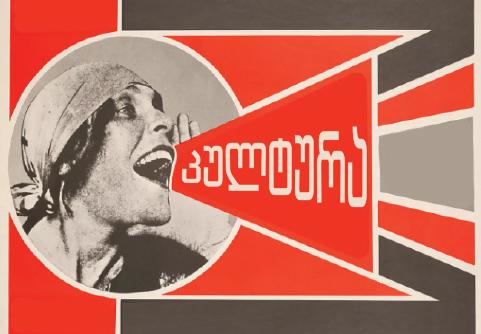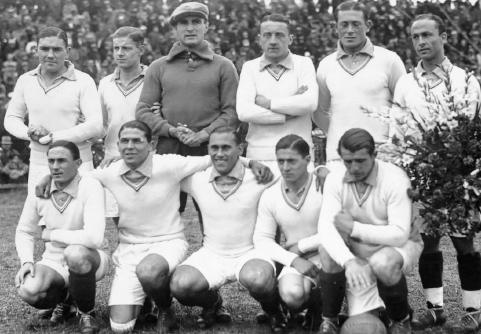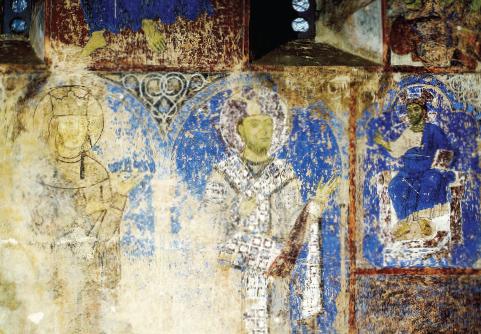
Author : Buba Kudava

Stereotypical and subjective attitudes; narrowing the study of history to the study of facts, names and dates; misunderstanding of the historical process; failure to consider the general and international context; lyrical-heroic perception of Georgia's past; mythologization of history; sacralization of notions, events and persons; the formation of a vision in terms of positive/negative; rejection of alternative versions; exaggeration of the role of a personality; unconditional trust of local sources; protest against the revision of clichés; presentation of history as an uninteresting and useless subject: These are some of the obstacles and challenges facing our love of Georgian history today.
On top of that, the faces and deeds in history are not always as white as they are presented to us by ancient chroniclers or modern scholars. Neither the news of a different kind is as black as painted by the same historians. We too often follow this white and black scheme and justify the chosen ones of history and denounce those who are condemned by both the old and the young.
But history, beyond life and the world in general, is surprisingly rich. That's what this whole story is about.
So, let's begin – “Colorful Stories”.
Here, from time to time, I will share with you all sorts of stories and colorful thoughts that I have collected over the years.
Buba Kudava
At the Royal Chessboard
Giorgi III, by the irony of fate or history, is mainly known as the father of Queen Tamar. However, at the time, no one could have imagined that Tamar would become the Tamar, because it was Giorgi's turn to become the Giorgi, and at home or abroad, in the royal family, within the borders of the kingdom or beyond, by the standards of that time a completely different era of great reflection and challenge had come.
The greatest achievement of Giorgi, known for his victories, was probably his coronation with a crown that did not belong to him, as it belonged to his elder brother and later to his nephew. The reign was a major victory which paved his path in the future. However, there were many more glorious days ahead and he was not satisfied with what was offered or won and continued to gain more and more with each battle or calculated plan.
It is clear from his biography that the main secret to the success of such an illustrious king was this: He was never dizzy with victories! He was always alert and spent his life pondering and judging. And how could he relax when a major concern had haunted him since that most important victory. That concern was Demna Batonishvili, the only son of his own brother.
Let's remember these stories as we learned them: David the Builder’s heirs apparently had many black cats crossing their paths. First, the eldest son of David the Builder, Demetrius I, stabbed out the eyes of his younger brother Vakhtang (whom we mistakenly call Tsvata). Then tensions grew further in Demetrius’s family: his own sons could not tolerate each other and were not supportive of each other at all. Demetrius’s elder son David was disobedient and stubborn; the younger son Giorgi (future King Giorgi III) was obedient. The parents favored Giorgi (although the throne rightfully belonged to the elder son). David hastened to seize the crown, forcing his father to abdicate and become a monk. Six months after his crowning, he died, the story goes. He left behind a son, Demetrius/Demna Batonishvili. The old Demetrius returned from the monastery and appointed as a co-ruler not Demna but Giorgi, “the sweet and obedient son of his father”. The elder Demetrius soon died, and Giorgi III remained the king and the ruler. Demna had meanwhile grown up. The strengthened Orbeli family incited and organized a rebellion under the pretext of installing the prince onto the throne. The rebellion was crashed and the young man who wanted to take the throne was punished. After this Giorgi III, who had no son, left the throne to his daughter, Tamar.
This time, let's not touch on the unexpected or predictable death of the shortest-lived king in the history of the Kingdom of Georgia (if one of the Armenian sources expresses doubts, the other claims that Demetrius’s son David was killed; Georgian chroniclers maintain the right to remain silent). Let us raise other legitimate questions: Had Demetrius really been ordained a monk, how did he return to the throne? Did he take off his monastic robes and put on his royal apparel again? At that time and in such a kingdom? It's just unbelievable, for heaven's sake. And if he did not renounce monasticism, what right did he have to appoint a co-ruler, bless a new king, or make speeches from the throne? Secondly, even if he returned as a monk or a layman, Giorgi's accession is an attempt to legitimize lawlessness and completely contradicts dynastic principles. It turns out that the king or former king had the right to pass on the kingdom to any heir at will. Does this not turn the principle of primogeniture upside down? It must also be said that the sources do not unequivocally confirm the return of Demetrius.
Some researchers believe that Giorgi's reign was formally based on the principle of succession from brother to brother according to the will of David the Builder. What kind of force should have had the paternal will, which Demetrius did not fulfill himself (not only did he not pass the reign to his brother, but crossed him out of history when he was still a youth)? And most importantly, like other researchers, I am deeply convinced that David, who fought day and night for the centralization of the country, did not write such a will. This document, which has survived in the form of later manuscripts, is a forgery and there are a number of logical arguments to suggest so.
I think it is quite clear: No matter how much the story of Giorgi's accession was embellished in the eyes of the people, the act was still unjust and illegal. The crown belonged to Demna, the son of the late king, David V. The enthronement of David's younger brother, Giorgi III, should not have deprived Demna of his legitimate rights. However, as the proverb says, both sides could have attached the handle to the pot where they preferred to, but there are general dynastic principles according to which the eldest branch of the dynasty continues the royal line, aren't there?
Yes, that Demna of ours was very young, but so what? The history of the monarchy has a lot of evidence of interim ruling of a country, with help from the inner circle, until the child came of age. Recall that Giorgi – an Armenian descendant of the Georgian Orbeli clan, Stefanos Orbeliani, confirms in the genealogical chronicles – was interim ruler until Demna came of age. If we consider this version less credible, it is still interesting as an attempt to imagine a fair model of governance.
In short, it was Demna's crown that stood on Giorgi's head, whether his father had left it to him or he had put it on himself. And it was King Giorgi who organized this in the first place. And how could he have forgotten about it, not remembered it, and let his attention slacken even for a moment?
It did not take great predictions or the wisdom of philosophers to realize that somewhere, sometime, something would happen. Either the uncle would get rid of the nephew, or the nephew would reclaim his father's crown. Or at least he would try to. Either he would ambush him at the right moment or wait for something to happen. Such are the natural instincts of royalty.
We know little about what was happening to Demna, from orphanhood to rebellion. We do know that he became related to Ivane Orbeli by marrying his daughter. Weird, how can one understand these feudal minds: Armenian sources accuse Ivane, amirspasalar (head of the military) and the most influential nobleman at the court of Giorgi III, of killing Demna's father, David V, with Giorgi's consent or on his instructions he was sent to the other world, and, look how things have changed years later. Ivane and Demna have already become relatives and allies.
It is reported that Demna was originally “adopted” by the Orbeli. They seem to have been pardoned for the sin committed by this deed by their service to Giorgi: They received the right and honor to bring up the prince, they retained leverage to neutralize future threats (whether coming from Demna or Giorgi), and most importantly, this guardianship left them with a "trump card" for the future. This was also to Giorgi's advantage – yes, the pretender to the throne had to grow up in the court of an ally, not in the lair of the opponent.
When the time came for Demna's betrothal, the interests of the king and amirspasalar would coincide here too: by keeping Demna in the family, now with the status of a son-in-law, the allies would retain control over the Prince. However, the King and the Feudal lord would gain different benefits. The father-in-law would gain the prospect of his son-in-law becoming king (King Giorgi had no sons!), while Giorgi would have an excuse to humiliate his rival: A royal man marrying a woman not of a royal line; thus, if the path to the royal throne was not blocked altogether, it was at least hindered to a great extent.
It was not just his uncle and father-in-law who had their own interests. Demna did not fail in this alliance either, he strengthened his position with a strong rear – for he lived in fear of the constant threat of being ousted. He was also waiting for a tailwind to make his way to the royal throne.
Of course, the big political players and the oppressed Batonishvili understood each other's goals and thoughts, but that is politics – to the extent that interests overlap, so are the levers and influence shared. I am sure that Giorgi also knew that the lust for revenge was killing him and that Demetrious Jr. would one day strive for the throne. If he didn't want to, it would have been even more surprising, especially after it was finally apparent that King Giorgi would live out his life without having a son.
The fact is that the prince, unhappy, orphaned and captivated by his own status, had no choice. Either he or his uncle had to win. Either the crown or death. There was no third way, neither in his homeland nor in exile. For him there was no way into the laity, but into monasticism and monasteries, without a problem. But the question remained, would he be allowed to lead a carefree life and take care of his soul there?
Why didn't Giorgi III get rid of the royal child from the beginning? Or sooner than later? It was said above that there would be the Orbeli factor: In getting rid of David V, the interests of the respected family could not be ignored. Of course, the powerful Orbeli family would be especially concerned about Demna's safety (for a powerful family this would be a golden lever in domestic political disputes!). Therefore, even the king would not find it easy to kill the prince. Besides, it wouldn't have happened without a major confrontation with the Orbeli. There is one more thing: Getting rid of the child would damage Giorgi's already tainted moral image, and who knows what kind of resonance and fateful consequences it would have had in the future. The king was not so naïve. He was well aware that to eliminate a rival one had must have a valid reason and gain a moral advantage.
Why did Giorgi III not stop a dangerous political project at its root – the far-reaching Demna-Orbeli marriage? Couldn’t he refuse to give his consent, his blessing and express his royal refusal? He did not do it, because he chose a very different chess game to prepare very different moves and to think about the long checkmate.
Perhaps this question will arise from time to time among those who think about these stories: what would happen, in the end, he could have adopted his nephew Giorgi... especially after he was sure that he would not have an son to be heir. What? Wouldn't everything have been settled? It seemed to have been a velvet solution – both for the dynasty and the kingdom. But, alas, this world is not arranged like that, it has not been like this from the expulsion of Adam and Eve up to now. And then why should we judge Giorgi and why should we expect something there, where enormous power and thousands of political-economic interests are now entangled?
Our King Giorgi had very different goals, very different... his instincts of a king and a parent and his political intuition told him that it was time to cross out the history of Georgia and write a new one ...
Two Contenders for One Throne
In Georgian sources, Demna was mature, rebellious, and influenced by the Orbeli. The same is said about him in the writings of his contemporaries: He is of legal age, but has become a puppet in the hands of the nobility, and in 1177 a rebellion was organised against the king on the pretext of his enthronement.
But we forget to enquire about the prince before the Orbelis' intervention. Where was he, what was he like, where did he grow up, where did he live, what did the king's son and the king's nephew do, what role did he play in domestic political affairs, who did he get on with and who did he avoid? What was troubling him about his lost throne and what did his uncle, King Giorgi, think of him. Did they see each other? Was he able to arrive at the king's court unannounced, did they feast together and have conversations with etiquette, bows and expressions of mutual respect?
The children of the sibling brothers, Demna and Tamar, did they know each other? Obviously, they knew each other. It could not have been otherwise: one kingdom, one royal family, political elite, ceremonies, visits, receptions, parades, races, feasts, greetings, bows, conversations... And as children, were they visiting, having fun, playing together? They were from the same generation, but they probably had a chilly relationship.
In short, we don't recall this Demna of ours before the uprising, and it's as if we don't care, and it's as if he didn't even exist.
And do we suppose that Giorgi III would have cared either? It cannot be that such a strong, far-sighted and determined monarch would not have kept an eye on the moves of Demna or the nobles surrounding the prince. It is hard to imagine that he was not constantly in the sights of spies and that hot news did not reach the king's chambers from time to time.
Demna was the only son of the former king, and Giorgi III, who had been crowned legally or illegally, was already a crowned monarch. Both stood on their own “bell tower”, both had their share of truth, and neither of them would be honest with themselves. The throne, the crown and the scepter were to remain with one of them. In such a situation, virtue among the royal men and peace in the country became difficult to achieve, and the only way remained: Either one had to win by force and intelligence, or the other.
What choice did they have?
Sometimes we naively think that if one of them had generously given up the throne, the country would have been doing well, too! Alas, there was no such thing in the Middle Ages and the land was not painted in such colors. You are not alone in making this decision, you have a whole army of adventurers and opportunists with you, and to give up the throne is to give them up. Neither would they nor the one for whom you conceded this honor leave you in peace and let you be happy. You will not be magnanimous for him, you would be weak and still a threat – what if you were to change your mind or someone made you change it and you again sought the crown? In the end, you would be left doomed and your right to a quiet life revoked.
To cut a long story short, either Demna had to overthrow Giorgi or the uncle had to get rid of his nephew. It is difficult to say from what age Demna started to dream of the paternal crown fitted on his uncle's head, but we can say with certainty that Giorgi III started thinking about Demna's neutralization from the day he ascended the throne. As we said, the murder of Demna, overt or covert, was not in his best interests. This would damage the reputation of the already crowned king and would increase anxiety in the country.
So there had to be a good reason!
And what better reason could there be than an armed rebellion against the king? None indeed.
According to the sources, it looks like Giorgi was not expecting an uprising, but let us think again: How could he not expect action from the illustrious nobles or from the heir to the throne? Especially if they were bound together by marriage and kinship ties! And all the more so if you are King Giorgi III, well-versed in the intrigues of the royal court and having already survived many fights.
He expected, of course, he did. He had been expecting it for a long time, gathering reliable information and letting the process run its course. He let it go as if the reins had slipped out of his hands, but he did not run away; he must have had his finger on the pulse and had the enemy camp packed with his men. He was gathering his strength and was preparing to receive decisive news.
The uprising went down in history as the Orbeli Rebellion. The ruler of the lower provinces, the ruler of Ani, once the most important city of the South Caucasus, Amirspasalar Ivane Orbeli acting as leader, and in addition to his household, many other nobles involved in the uprising. This force in military terms meant hundreds (if not thousands) of professional soldiers armed to the teeth and dozens of nobles’ fortresses, while in civilian terms it meant a large part of the kingdom and tens of thousands of active and passive supporters. All of them, of course, are driven by self-interest (as were the king's supporters), but they would also have had logical arguments – for example the fact that King Giorgi had no son.
In short, the traitors and those loyal to the king regrouped as per one would expect, and fighting, clashes and massacres ensued. This process would have been useful for more than just getting rid of Demna. By identifying the opposition forces and the people of his rival prince, the king would obtain the legal right to punish them. This is a unique chance to get rid of everyone at once who had been a problem during his 22 year reign. And finally, and most importantly: Giorgi III needed the most powerful, country-shaking impulses so that then, amidst the lull and victory over those fluctuations, no one could oppose the implementation of a revolutionary and completely unheard of decision – his decision to enthrone a woman!
Gradually the ranks of the rebels thinned. They began to move into the king's camp. The shrewd king received them all affectionately and promised them Orbeli estates and honors. Among them must have undoubtedly included those who had infiltrated the rebel group beforehand. At the first stage their task would have been to get information, stir up discontent, inflame the situation and provoke mutiny, and after the mutiny move into the king's camp and thereby break the fighting spirit of the participants. Sargis Mkhargrdzeli , who was the first to leave the Orbeli-Demna camp, seems to have been sent on this mission, and because of this Giorgi III not only forgave the betrayal (this is logical), but after suppressing the rebellion elevated him and his family (this is already suspicious). This line is continued by Tamar, who glorifies the sons of Sargis, Zakaria, and Ivane, and endows them with positions, honors, and fortresses.
Anyway, let’s go back: They ended up encamped in the fortress of Lore. People were sent to neighboring states to ask for help. The siege lasted six months. No help came, and the rebels broke down. At night, the nobles began to throw a rope over the besieged castle’s wall, slowly climbed out, went to the king and begged for mercy. The king had mercy on everyone and, probably encouraged by this, finally the rope was lowered quietly by Demna in secret from his father-in-law, and he descended and stood before his uncle and repented. Shortly afterwards, the fortress of Lore fell.
Ivan Orbeli was blinded. The rest of the Orbeli were executed, and thus the former leader left alive was subjected to an even more bitter insult.
The uncle did not heed his young nephew. A long-running political project was nearing completion, at that time, and there was no room for sentimentality! Demna was blinded and castrated. He soon died. The trauma – physiological or psychological – was great, the situation was extremely stressful, and perhaps this time the chronicler was objective and he did die his own death, but I wouldn’t be surprised if the prison guards also had a heavy hand in it. Morale was already on the king’s side and who had the right to doubt or resent it!
Another episode of the royal series came to an end. The long epic battle for the throne between the brothers was over. Demna’s short life ended too. He was not buried in Gelati next to his father, grandfather, and great grandfather. He was buried in Svetitskhoveli, and this too was a royal calculation: Demna’s family name was honored, while Demna himself was deprived of honor.
In short, Giorgi defeated him. He outclassed him with his arm, his head, and his backbone. Outmaneuvered him in the main thing: He kept feeding his opponents with illusions and idle thoughts while he himself did not succumb.
I do not know what really happened – someone might draw their own conclusions, and rightly so, but who has forbidden us to think, to judge and to read into books written by the victors relying on facts, logic, and imagination? No one indeed.
Vanity of vanities. So quickly was the male line of David the Builder cut short.

